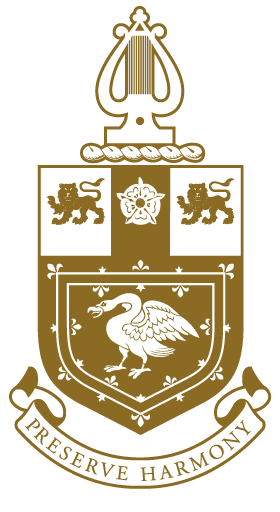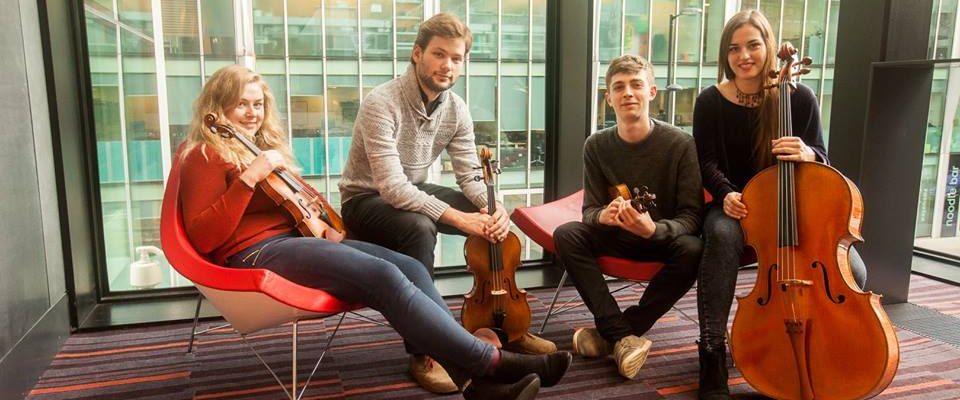Young Artist Interview: Jens Lynen
Jens Lynen is a Belgian violinist and founding member of the Tetragonist piano quartet, whose 2014 debut album received international acclaim. A past winner of the prestigious Constant and Kit Lambert Junior Fellowship, Jens has performed worldwide as a soloist, chamber musician and in orchestras with prominent conductors including Bernard Haitink, Sir Colin Davis, Sir Roger Norrington, Vladimir Jurowski, Vladimir Ashkenazy and John Adams.
When did you start playing the violin?
I started playing the violin when I was six years old after I became fascinated with a CD of violin music we had at home. I told my parents I wanted to play the violin after listening to it, although according to my father it was my mother who was especially glad to hear me say this and she quickly got me my first instrument.
How has the Constant and Kit Lambert Fellowship helped your career?
The Fellowship has helped my career in many ways! First of all, it provided me with financial support during my Artist Diploma studies at the Royal College of Music between 2013-14, enabling me to focus solely on my artistic development and organise various projects within the RCM (such as the Interwoven Classics project, combining chamber music works with culturally linked literature or poetry). Organising these projects gave me very valuable experience in this field as well as the confidence to expand this project after my college studies. Also, after my Fellowship at the College had finished, the WCOM provided me with many performance opportunities across London and the UK and various outreach opportunities and I can’t thank them enough for their help and support.
Tell me about your piano quartet Tetragonist and recent album
We recorded the Quartet for the End of Time with our ensemble Tetragonist as well as mirroring a composition by our pianist and composer Mathias Coppens. It was a very daunting task for us to record such a masterpiece whilst all still being so young and in education, but it ended up being an invaluable journey for all of us and I am very grateful we decided to go ahead with the project in its entirety. It was a great way to bond with the quartet, explore new sound worlds and develop our own playing during the recording week. We were happy the album was well received and its release has been a great help for us as an ensemble.
Who are your favourite musicians of all time?
Too many to name! But I would definitely like to include three musicians in particular who have inspired me over the years and meant a great deal to me at various stages in my life. I would choose the conductor Sergiu Celibidache for the way he influenced my thinking in my mid-teens; the way he spoke about music and its basic elements was a real eye-opener to me and in many ways a catalyst to a period of intense study and self-reflection. Also, I have always respected, admired and learned a lot from the outspoken opinions of Glenn Gould, whose recordings I became obsessed with for a long time during my teens. And, of course, Ludwig van Beethoven, whose work almost invariably touches me deeply.
You’ve performed across Europe and the US. Which venue did you most enjoy, and why?
Upon finishing our recording of Messiaen’s Quartet for the End of Time, we travelled with our piano quartet to Gorlitz to the site of the former Nazi work camp where Olivier Messiaen was sent in 1940. We performed the work on the exact location where it was composed and first premiered on 15 January 1941 on the very same day 73 years later. It was a very moving experience for all us and a concert I will never forget. There was also a mini-documentary made of our trip and experiences there which can be found on YouTube .
What makes a good live performance in your opinion?
A combination of engagement on behalf of the performer as well as a never-ending attention to the arch of the performance. In every great performance I can remember both elements played a vital role and I believe without either of them it is very hard to convince an audience. I also think it is a vital requirement as a performer to enjoy the performance yourself in the first place if you expect an audience to do the same; it is very much an act of unreserved giving.
Do you have any pre-performance rituals to prepare you for the stage?
I always make sure I drink plenty of water. Also, I find great comfort in playing my violin right up until the point I have to go on. The feeling of my instrument and strings take away some irrational fears or worries and always make me feel more at ease. I usually go over similar exercises to make sure I am properly warmed up and try to channel as much positive energy as possible before going on.
What’s the hardest part about being a violinist?
The always returning self-doubt, no matter how well things might be going at a certain moment in time. I think it’s inherent to honest musicianship to aim for better and more all the time and never be fully pleased or satisfied with a performance or recording, though it can be very tough at times. More specifically for violinists, we are very dependent on our instrument. There have been several occasions I have had to return an instrument or bow to its owner after having had it on loan, and most times it’s been a sad separation!
What violin do you play, and how would you describe your relationship with it?
I play an anonymous Italian/French violin from the early 18th century, assembled by Hill around 1900. It’s my own instrument and as I have owned it for a long time now I am very comfortable with it. As I mentioned above, I sometimes get an instrument or bow on loan for special occasions or concerts as I wouldn’t be able to afford such instruments myself. However, coming back to my instrument always feels like coming home!
What do you have planned for 2016?
There are some really nice musical projects coming up in the UK and across Europe! A new recording, chamber music concerts with repertoire and people who are very dear to me, the expansion of the Interwoven Classics project into an entire new concept (including writing much new material), continuing to play with John Wilson Orchestra and various other orchestras, a couple of solo projects, teaching on some summer courses… The wonderful thing about being a freelancing musician in London is the variety of things we are allowed to do and that’s probably what I look forward to most.
You can find out more about Jens at www.jenslynen.com .





